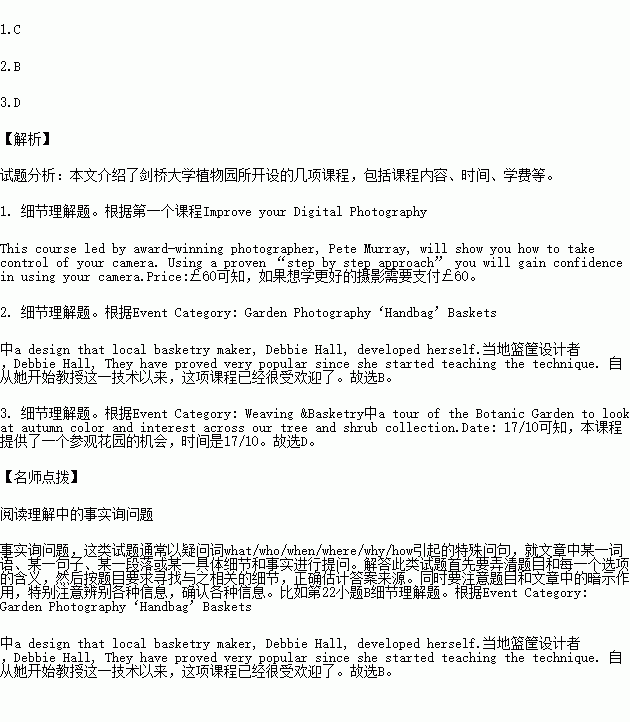题目内容
Cambridge University Botanic Garden
We run a lively programme of family events, life-long learning courses and much more throughout the year.
Improve your Digital Photography
This course led by award-winning photographer, Pete Murray, will show you how to take control of your camera. Using a proven “step by step approach” you will gain confidence in using your camera.
Date:29/09
Time:10 am—4 pm
Price:£60
Event Category: Garden Photography
‘Handbag’ Baskets
New to the Botanic Garden, this course will give you the opportunity to make your very own beautiful ‘handbag basket’from a design that local basketry maker, Debbie Hall, developed herself. They have proved very popular since she started teaching the technique.
Date: 07/10
Time: 10 am —4:30 pm
Price: £120
Event Category: Weaving & Basketry
Trees and Shrubs(灌木) for Autumn Color
Join Mark Crouch, a specialist in the care of trees, for this course on choosing trees and shrubs to create beautiful autumn displays for your garden. The day will include a talk in our classroom and a tour of the Botanic Garden to look at autumn color and interest across our tree and shrub collection.
Date: 17/10
Time: 10 am —4 pm
Price: £50
Event Category: Gardens and Plants
Introduction to Botanical Subjects in Colored Pencil
If you are interested in beginning to use colored pencils to draw botanical subjects, then this is the course for you. Janie Pirie is one of the country’s leading pencil artists and on this one-day course she will show you the basic techniques used when working with colored pencils.
Date: 16/10
Time: 10 am —4 pm
Price: £40
Event Category: Botanical Art
1.How much would you pay if you wanted to learn to take better pictures?
A. £40. B. £50. C. £60. D. £120.
2.Who is good at making baskets?
A. Janie Pirie. B. Debbie Hall.
C. Pete Murray. D. Mark Crouch.
3.The course that provides an opportunity to tour the garden is held on __________.
A. September 29th B. October 7th
C. October 16th D. October 17th

